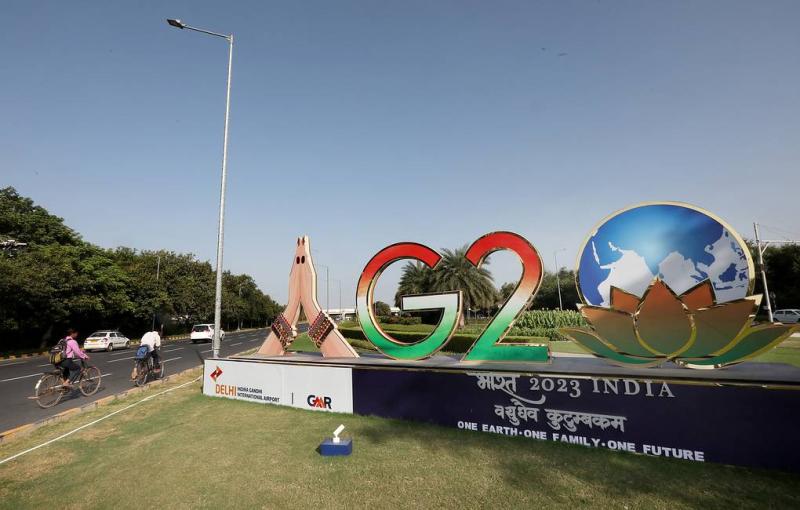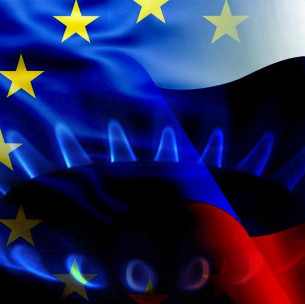
© EPA-EFE/HARISH TYAGI/TASS
- Press review: US lets Kiev use anti-personnel mines and Iran may halt uranium enrichment
- Press review: Uranium costs soar as Moscow updates nuclear doctrine and US OKs attacks
- Press review: Russian air defenses can down Western missiles as EU conducts live exercise
- G20 leaders adopt Rio de Janeiro Summit Declaration
Top stories from the Russian press on Wednesday, September 6th, prepared by TASS
The G20 plans to grant the African Union full membership at its New Delhi summit this weekend; Moscow is cautioning Washington against re-stationing its nuclear weapons on UK soil after a 15-year hiatus; and the EU is 'out of ideas' and in no rush to impose its 12th package of anti-Russian sanctions on Moscow. These stories topped Wednesday’s newspaper headlines across Russia.
Vedomosti: African Union to become full-fledged G20 member at New Delhi summit
The G20 plans to admit the African Union (AU) as a full-fledged member at its 18th summit to be held in New Delhi on September 9-10. The corresponding provision will be included in the G20’s final declaration, which is currently being drafted, Russian G20 Sherpa Svetlana Lukash told Vedomosti. According to her, Russia was one of the first countries to support the AU’s application, which was filed last year by Senegalese President Macky Sall, who chaired the AU in 2022 and called upon the G20 leaders to grant the Africa-wide bloc a permanent seat in the group. "Russia believes that, once implemented, the initiative of African nations would contribute to strengthening the positions of the majority of countries worldwide and the interests of the Global South," Lukash said. Russia’s G20 sherpa recalled that Russian President Vladimir Putin had publicly voiced his support for the AU joining the G20 at the Russia-Africa Summit in St. Petersburg in late July.
On Monday, Prime Minister Narendra Modi of India, which is currently chairing the G20, emphasized, in a comment to South Africa’s Mail & Guardian newspaper, that New Delhi was an advocate for the AU gaining full G20 membership. While the G20 already includes South Africa, a BRICS country, as a member, New Delhi also invited Nigeria and Egypt, representing Sub-Saharan Africa and North Africa, respectively, to attend the summit. Supporting Africa’s application is in India’s real economic interests, as many Indian companies have a footprint on the continent, said Aleksey Kupriyanov, chairman of the South Asia group at the Russian Academy of Sciences’ Primakov Institute of World Economy and International Relations (IMEMO). According to him, New Delhi is also counting on earning high-profile PR points to burnish its reputation as a Global South leader.
As for the European Union, the fact that African countries have mostly maintained a neutral stance on anti-Russian UN resolutions over Ukraine is a cause for worry in Brussels, thus prompting the bloc to look for ways to influence Africa, one of which is Brussels’ support for upgrading the continent’s status within the G20, explained Pavel Timofeyev, head of the European Political Research Department at the Institute of World Economy and International Relations.
"Bringing the AU into the G20 would enhance interaction between Russia and the continent and give Russian businesses better market opportunities there," Natalya Piskunova, associate professor at Moscow State University’s Department of World Politics, concluded.
Kommersant: Russia cautions US to avoid escalation, refrain from re-stationing nukes in UK
Russia would view any move to return US nuclear weapons to British soil as an escalatory action, Russian Foreign Ministry Spokeswoman Maria Zakharova told Kommersant on Tuesday. She slammed the potential US initiative to return US nukes to Britain after a 15-year hiatus as a purely anti-Russian destabilizing move, adding that it envisioned joint planning and practicing regularly for nuclear attacks on targets in Russia from non-nuclear European countries. "We will continue to press our demands that the entire US nuclear arsenal be returned to US soil and that the infrastructure enabling the rapid deployment of nuclear weapons to Europe subsequently be dismantled," Zakharova warned.
The Federation of American Scientists (FAS) and two British newspapers, The Telegraph and The Guardian, reported last week that US tactical nukes may be sent back to the UK. Experts and reporters noted that the US has secured $50 mln in funding for a project to build a 144-bed dormitory at RAF Lakenheath in Suffolk, England. The base currently hosts US F-15E Strike Eagle and F-35A Lightning II combat aircraft that are capable of carrying nukes. And there are plans to increase the number of F-35A aircraft soon.
According to Dmitry Stefanovich, a researcher at the Russian Academy of Sciences’ Institute of World Economy and International Relations and co-founder of the Vatfor project, even if the US does deploy its nukes to Britain, this would hardly signal a change in the nuclear doctrines of either Washington or London, or in the nature of joint NATO missions. "Moreover, just like the United States, Great Britain is a `legitimate’ nuclear power, as per the NPT (Treaty on the Non-Proliferation of Nuclear Weapons - TASS). Therefore, even the existing criticism regarding the deployment of nuclear weapons to non-nuclear powers or training their military to use them for combat purposes doesn’t work here," the expert told Kommersant. However, he added, what one can be sure of is that such a move would hardly be likely to facilitate any hypothetical negotiations on the future of non-strategic nukes.
Meanwhile, Britain’s Campaign for Nuclear Disarmament (CND) is planning a large-scale protest against the initiative on September 23. "The deployment of the new B61-12 to Europe undermines any prospects for global peace and ensures Britain will be a target in a nuclear conflict between the US/NATO and Russia. It’s beyond irresponsible that the UK government is allowing this deployment," the CND said.
Izvestia: EU 'out of ideas,' in no rush to draft its 12th set of anti-Russian sanctions
The European Council, part of the European Union (EU) executive branch, is not currently discussing imposing additional sanctions on Russia, several members of the European Parliament (MEP) told Izvestia. "However, civil society and the European Parliament are seeking to crack down on third countries that help Russia circumvent sanctions, especially restrictions on the export and re-export of Russian oil and gas," German MEP Gunnar Beck pointed out. According to him, among other proposals being discussed in Brussels, there are restrictions on dual-use goods that "can be used for the production of missiles in Russia" and the imposition of sanctions on individuals and entities, including state-owned nuclear power corporation Rosatom, as well as the creation of a legal framework for the confiscation of frozen Russian assets, he said.
Despite the collective West’s ardent desire to continue putting pressure on Moscow, with each consecutive round of restrictions the scope of activities that Brussels can sanction only gets thinner. "The process is going very slowly, as [the bloc] has simply run out of ideas," Croatian MEP Ivan Vilibor Sincic, a member of the delegation to the EU-Russia Parliamentary Cooperation Committee, told Izvestia.
Georgiy Ostapkovich, director of the Center for Business Trends Research at the Higher School of Economics (HSE University), said that those sanctions that have been imposed on Moscow to date have failed to bring Western leaders the expected result, namely the hoped-for implosion of the Russian economy. "However, the sanctions do cause destruction, as access to hi-tech Western equipment is cut off for you. Before the sanctions, equipment supplied by Western countries accounted for 48% of Russian imports," Ostapkovich told Izvestia. "Certainly, businesses and economic agents were hurt, as they were deprived of innovative equipment. On the other hand, this gave an impetus to import substitution and technological breakthroughs. And the economy has been rebuilding. In these circumstances, Russia is trying to reformat its economy toward producing high-value-added goods," he said.
Meanwhile, the West will press on with its relentless sanctions campaign, Ostapkovich believes, as he expects the EU to continue rolling out more sanctions packages for as long as the Ukraine conflict remains unresolved.
Media: Russia may slash oil production in wake of oil exports decline
Russia and Saudi Arabia remain committed to their common policy of voluntarily reducing oil supplies. Russia, for one, extended a voluntary supply cut of 300,000 barrels per day (bpd) for September until the end of 2023, and Saudi Arabia, as well, extended its 1 mln bpd cuts to the year-end. Until recently, as regards reducing its oil exports, Russia has sought to do so without hurting crude production, by increasing refining volumes. It may not be able to continue such a policy this fall against the backdrop of refinery repairs, however, and hence Moscow is cautioning that oil production may fall. In any case, decisions in this regard will be made on a month-by-month basis.
So, in September-October both Russia and Saudi Arabia will export 200,000 to 300,000 bpd more than in the summer months, while their production volumes will hardly change. According to Viktor Katona at Kpler, those repairs that can be postponed to next spring will be delayed due to the highly attractive terms for exporting petroleum products. Only if repairs are put off until 2024 and the capacities of some oil refineries receive additional loads will Russian oil producers have to cut production, Katona told Kommersant.
In an interview with Vedomosti, BCS World of Investments asset manager Vitaly Gromadin described Russia’s decision to extend voluntary cuts until year-end 2023 as a logical step. And Finam analyst Alexander Potavin argued that Russia and Saudi Arabia were mostly guided by their own interests. While the Saudis need expensive oil to implement their ambitious investment projects, Russia needs it to replenish its budget, with oil and gas revenues lost for the first eight months of 2023 exceeding 630 bln rubles ($6.4 bln), according to the Finance Ministry, the expert explained. Potavin estimated that lower oil supplies from Russia and Saudi Arabia may push the oil deficit in the market to as high as 2 mln bpd amid potential growth in demand.
Izvestia: Moscow finds sanctions-loving EU unable to kick Russian LNG habit
The EU will not impose a ban on Russian liquified natural gas (LNG) as this would lead to higher gas prices in the market, the Russian Permanent Mission to the EU told Izvestia. Nevertheless, ending its reliance on Russian energy as soon as possible remains a priority for the bloc. Experts believe, however, that the European Union will not be able to wean itself off of Russian energy imports entirely, including LNG imports, despite such ambitions. Moreover, they insist, EU countries will buy even more Russian LNG next year.
Diplomats argue that the idea of banning Russian LNG lacks wide support within the bloc. Instead, it is mulling granting certain member countries the right to impose such restrictions at the national level, the Russian mission said. And yet one should not expect sanctions to be lifted from Russia any time soon, as the policy of reducing Russian energy imports is closely connected with Brussels’ declared course toward pursuing a "green" transformation of the economy.
Alexander Frolov, deputy head of the National Energy Institute and InfoTEK expert, told Izvestia that the EU has so far been unable to put an end to its energy dependence on Russia. "Due to various issues related to infrastructure, Russian pipeline gas supplies have shrunk by about 100,000 cubic meters per year," he said. "And the EU has no alternative gas suppliers," he added. According to Frolov, the United States, which accounts for some 44% of the EU’s LNG imports, cannot fully replace the Russian share in the European market.
Completely refraining from Russian LNG imports would inflict an annual loss of about 20 bln cubic meters of gas on the EU, thus prompting the Europeans to sharply reduce their consumption, Frolov concluded.









